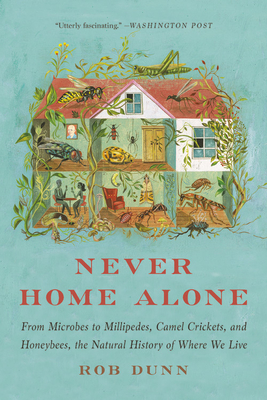

 Basic Books
Basic Books
Never Home Alone: From Microbes to Millipedes, Camel Crickets, and Honeybees, the Natural History of Where We Live


Key Metrics
- Rob Dunn
- Basic Books
- Paperback
- 9781541618305
- 8.6 X 5.5 X 1 inches
- 0.7 pounds
- Nature > Animals - Insects & Spiders
- English
 Secure Transaction
Secure TransactionBook Description
Even when the floors are sparkling clean and the house seems silent, our domestic domain is wild beyond imagination. In Never Home Alone, biologist Rob Dunn introduces us to the nearly 200,000 species living with us in our own homes, from the Egyptian meal moths in our cupboards and camel crickets in our basements to the lactobacillus lounging on our kitchen counters. You are not alone. Yet, as we obsess over sterilizing our homes and separating our spaces from nature, we are unwittingly cultivating an entirely new playground for evolution. These changes are reshaping the organisms that live with us -- prompting some to become more dangerous, while undermining those species that benefit our bodies or help us keep more threatening organisms at bay. No one who reads this engrossing, revelatory book will look at their homes in the same way again.
Author Bio
Most of the living world remains poorly or totally unknown. In my lab we study the species around us in our everyday lives, species we tend to think of us as well known. Most of those species are not well known and so there are many things to discover in your backyard, in your bedroom, or even on your roommate.
Some days I work to study these species myself, bending down to figure out whether the fungus on my neighbor’s foot is a new species. More often I spent my time working with students and other researchers to help along their own discoveries. I also write about the world around us, which is a chance to share the stories of the scientists who have devoted their lives to understanding species, organs, cells, genes or ecosystems that influence us every day. In my building alone I am surrounded by biologists who study prairie voles, rare butterflies, fish ovaries, dinosaurs with long, long, claws, the decisions we make when threatened with death, alcoholic fruitflies, fungus farming beetles, and much, much more.
It is a good job, this thing called science, silly at times, serious at others, but nearly always good.
Source: North Carolina State University
Community reviews
Write a ReviewNo Community reviews



